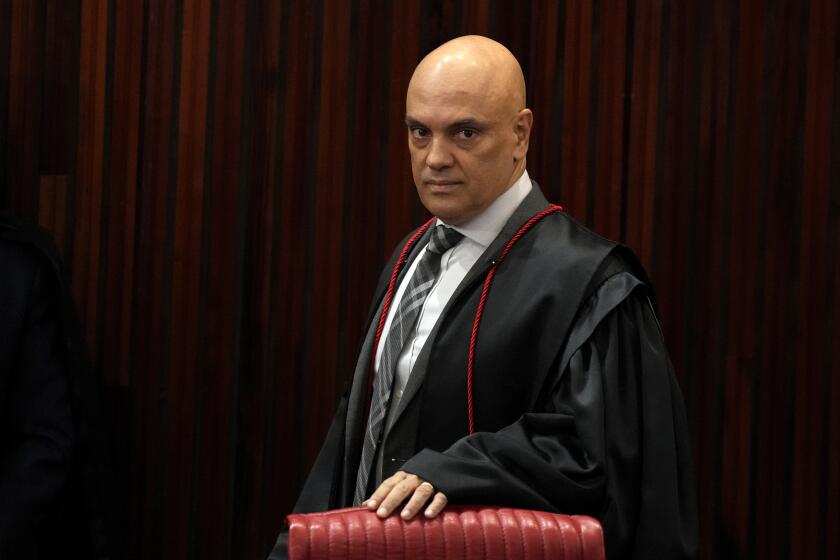U.S. Execs Say Korean Market Still Too Closed : Commerce: Although trade is nearly balanced, President Clinton is told in Seoul that persistent problems remain.
When President Clinton addressed South Korea’s National Assembly over the weekend, some American executives here may have winced just a bit. Despite persistent problems with South Korea’s closed markets, intellectual property violations and reams of red tape, Clinton mentioned economic issues in only two sentences.
But Sunday, U.S. executives got their chance to ply Clinton directly in a 40-minute meeting with the American Chamber of Commerce in Seoul. The message: “Don’t forget Korea,” said William Oberlin, the chamber’s executive vice president.
With attention focused on security issues and North Korea’s nuclear threat, South Korea rarely gets the intense scrutiny on trade issues that top the agenda of presidential visits to Japan. But this year in particular, economic issues took a low profile because a once-burgeoning trade imbalance is now roughly in equilibrium.
In addition, President Kim Young Sam has launched a campaign to crack down on copyright violations, unravel red tape and liberalize the financial markets to coax his sputtering economy back into health. In particular, officials are trying to lure back foreign investment, which has plunged from $1.2 billion in 1988 to just $688 million by the end of October last year.
Not that veteran U.S. executives are completely convinced that this campaign will last--or result in permanent change.
“Korea, unfortunately, has a history of agreements that have been less than fully fulfilled,” Oberlin said. “We’re very optimistic, but it’s also like what they say in Missouri: Show me.”
That skepticism, along with generous praise for Kim’s efforts, was shared with Clinton. The President was asked in particular to keep up the pressure--or “advocacy,” as chamber members put it--on South Korea to fulfill its commitments.
They asked Clinton to dispatch Commerce Secretary Ronald H. Brown to South Korea as soon as possible and speed up the U.S. process for licensing technology.
The members briefed Clinton on South Korea’s progress in setting out plans to liberalize several financial sectors and open access to markets in 132 industries over five years.
Most interest rates, for instance, will be deregulated by 1997.
Also, the bond market will begin to open next year, and ceilings on foreign ownership of Seoul stocks will be raised at least twice before 1997.
*
Chamber members explained that continued problems with intellectual property rights are the reason many U.S. firms are still reluctant to transfer technology--a repeated request by Koreans to help lift them from the low-value, labor-intensive sectors of shoes and toys to computers, software and other items of technological sophistication and high added value.
South Korea has cracked down on intellectual property violators this year with a special task force of 11 government ministries to ferret out fake Nikes and Reeboks, videotapes and handbags, computers and software.
In the first four months of this year, for instance, officials increased the number of arrests to 393 from 96 during the same period the previous year.
But some suspect that the government launched the campaign to avoid being labeled an unfair trader. Now, Oberlin said, the campaign appears to be flagging.
“I know (Clinton) had, from the Korean side, requests for U.S. technology, and we wanted to point out to him that one of the barriers to successful and easy transfer is protection of intellectual property,” he said. “We want to ensure that when I transfer my technology, it’s not going to boomerang on me.”
*
Executives also told Clinton about continued problems in importing consumer goods.
Still, Oberlin said, “We essentially patted the Kim Administration on the back,” in the meeting with Clinton, Secretary of State Warren Christopher and Treasury Undersecretary Lawrence Summers.
The President asked few questions but listened carefully in the informal discussion with the board’s 18 governors, he said.
Oberlin added that, under President Kim, the various ministries have made themselves far more accessible and responsive to foreign executives. “A year ago, we couldn’t get anyone to return our phone calls. Now they are extremely supportive.”
South Korea’s efforts may already be paying off. In the last few months, at least two U.S. firms--one retail, one manufacturing--have decided to invest in Korea, Oberlin said. The firms studied the market for two or three years, but it was Kim’s reforms that finally persuaded them to plunge in.
“Now we just have to see if (the reforms are) implemented,” Oberlin said.
More to Read
Inside the business of entertainment
The Wide Shot brings you news, analysis and insights on everything from streaming wars to production — and what it all means for the future.
You may occasionally receive promotional content from the Los Angeles Times.







